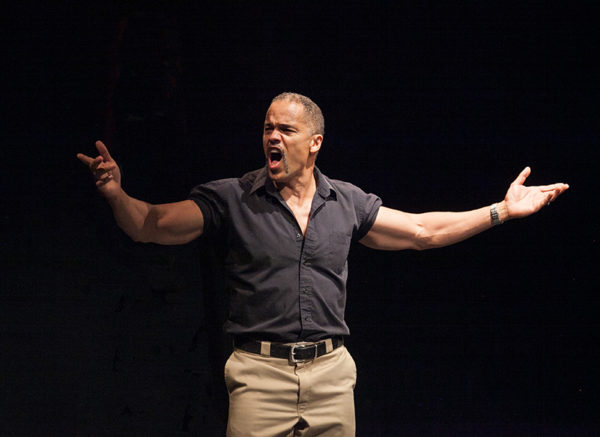Theater Review: “American Moor” — Lasting Impressions
By Robert Israel
American Moor sheds considerable insight into the tension between actor vs. director, into the power play between the two, and who will ultimately prevail.
American Moor by Keith Hamilton Cobb. Directed by Kim Weild. Presented by ArtsEmerson at the Paramount Center, 559 Washington St., Boston, MA, through April 21.

Keith Hamilton Cobb performing “American Moor.” Photo: C. Hovde Photography.
In this often-stirring return engagement of Keith Hamilton Cobb’s one-man play American Moor, the first thing audience members see when they enter the Paramount auditorium is the performer rehearsing his lines. The stage is cluttered with props for an upcoming production of Shakespeare’s Othello. Then the lights dim. When they come up again, we are cued to significant pivots in the action via Alan C. Edwards’s lighting design. Even before hearing Cobb speak, we see that he is meditating on being cast as Othello — and what it means to him as an African American actor performing this role in front of contemporary audiences. When the lights change again, we hear the voice of A Director (Josh Tyson), seated in the audience, issuing commands that require Cobb to interpret specific lines/scenes according to his wishes.
Cobb is being judged whether he is the correct fit for the role. Facing this kind of scrutiny brings, to his mind, many of his past struggles as a black man. On the one hand, he wants to please the Director, to get the gig. On the other hand, he wants be free to draw upon his experiences and talents – while also remaining true to Shakespeare’s script – to put, in other words, his stamp on the role.
American Moor sheds considerable insight into the tension between actor vs. director, into the power play between the two, and who will ultimately prevail. And, of course, Shakespeare’s words, peppered throughout, add gravitas to the struggle. The play brilliantly interweaves various clashing points of view – the Director’s commands, Cobb’s free-flowing, often angst-ridden, ruminations, and the language of the Bard himself.
Cobb’s performance moved me to experience Shakespeare’s complexities anew, and to consider the tense dynamic between actor and script, actor and director. I remembered a quote from the late Swedish stage and screen director Ingmar Bergman. “The wonderful thing about….Shakespeare,” Bergman observed, “…is there is a drive, a rhythm. You feel, My God, I can listen to this. It’s a fantastic feeling. It’s breathing.”
Bergman appreciated the unusual physical demands placed on an actor: “A good actor is very physical,” he argued. “I can talk to his body, and I know before he knows if his body-mind accepts or doesn’t accept what I want.” Without giving away American Moor’s final denouement, it’s too bad Bergman didn’t live longer to work with Cobb, who brings his A-game to this performance: viscerally, intellectually, and emotionally. The result is a compelling meta-meditation, political and philosophical, that leaves lasting impressions — while also provoking unsettling questions.
Arts Fuse review of the 2017 production of American Moor.
Robert Israel writes about theater, travel, and the arts, and is a member of Independent Reviewers of New England (IRNE). He can be reached at risrael_97@yahoo.com.

IT’S NOT JUST “sheds considerable insight into the tension between actor vs. director” , it tells the audience if he were a white man it would not have happened. BS. It happens all the time. Why make it political? Why mention Trayvon Martin? Why repeat “white director” again and again and again? Directors are known for their “vision” of “their” production and stand by it. I can’t imagine if the white actor insisted that he knew better than the director how to portray Hamlet would be listened to. Maybe? I think the play was extremely racist. I think it was meant the audience to feel racist. I resent this. Am I a racist?